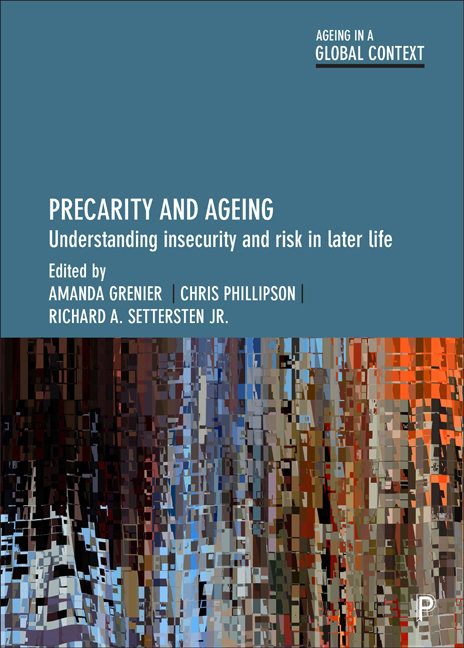Book contents
- Frontmatter
- Contents
- List of Figures and Tables
- Notes on Contributors
- Editors’ Acknowledgements
- Series Editors’ Preface
- 1 Precarity and Ageing: New Perspectives for Social Gerontology
- PART I Life Course Perspectives on Precarity
- PART II Precarity Across Situations
- PART III Austerity, Care and Social Responses to Precarity
- Index
8 - Reconstructing Dependency: Precarity, Precariousness and Care in Old Age
Published online by Cambridge University Press: 02 March 2021
- Frontmatter
- Contents
- List of Figures and Tables
- Notes on Contributors
- Editors’ Acknowledgements
- Series Editors’ Preface
- 1 Precarity and Ageing: New Perspectives for Social Gerontology
- PART I Life Course Perspectives on Precarity
- PART II Precarity Across Situations
- PART III Austerity, Care and Social Responses to Precarity
- Index
Summary
Introduction
Like ageing, care is a complex, embodied and uncertain phenomenon in which social and biological processes are tightly linked (Fine, 2007; Tronto, 1993). Consequently, the forms care takes vary not just for individuals or for gender or social class cohorts, but between communities and across different points in history (Fineman, 2002). In the human biography, the need for supportive care and support is closely tied to age. Our dependence on care varies in intensity through the life course, requiring extensive care in infancy as well as at different points in our lives, including during sickness or as a result of disability in adulthood. The likelihood of reliance on care, in the sense of personal assistance provided with the intention of enabling, supporting and enhancing life, tends to increase with advanced age. Late life is particularly likely to be associated with increased vulnerability, the result of physical ageing and disease as well as the uncertain and insecure social situation of older people. Appropriate responses involving the provision of care on a secure and personal basis are required. Without them, life may cease to be viable. Yet the sources of care are fungible and its quality and character variable. Whether care is provided, and if so how and by whom, are essentially social questions.
The need for care in old age is, however, commonly understood as a health and medical issue. This is a shorthand way of saying that a physical pathology develops for which a specialized diagnosis and appropriate clinical response is required. Medical research on this need has long been closely linked to the concepts of frailty and age-related decline (Collard et al, 2012; Grenier and Hanley, 2007), with evidence showing that patterns of need are both variable and dynamic (Fried, 2000; Higgs and Gilleard, 2014). Increasing attention is also being paid to a newly emergent explanation for this association, the self-described ‘geroscience hypothesis’ (Huffman et al, 2016; Sierra and Kohanski, 2017), which identifies biological ageing at the level of chromosomes and cells as the common and underlying cause of the health problems and multiple comorbidities associated with advancing age.
- Type
- Chapter
- Information
- Precarity and AgeingUnderstanding Insecurity and Risk in Later Life, pp. 169 - 190Publisher: Bristol University PressPrint publication year: 2020



